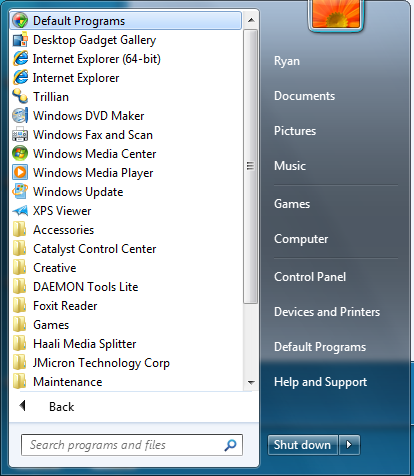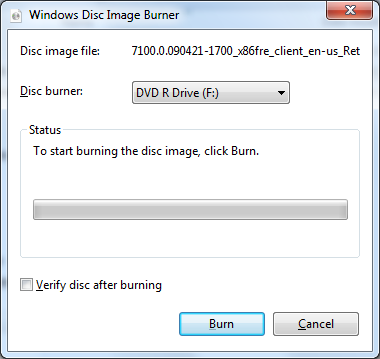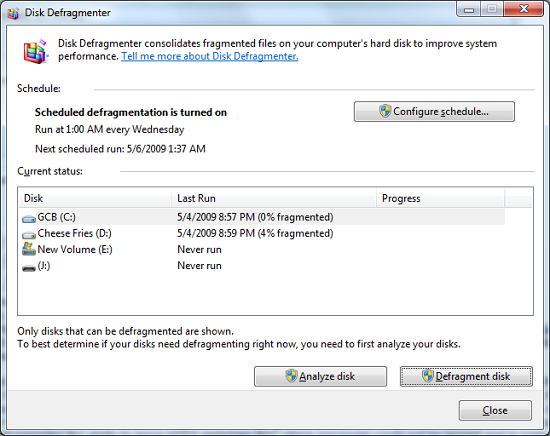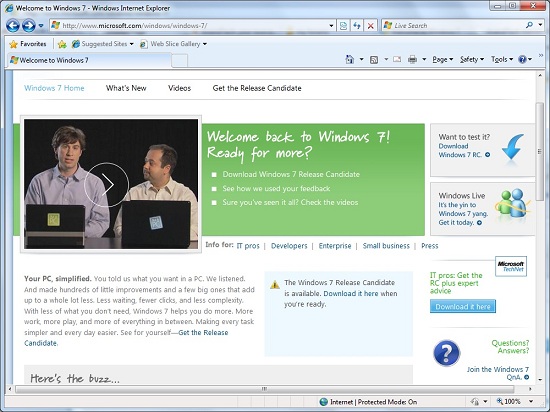Windows 7: Release Candidate 1 Preview
by Ryan Smith and Gary Key on May 5, 2009 11:00 PM EST- Posted in
- Systems
Internet Explorer 8 and the Rest
Rounding out our look at Windows 7’s applications, we have Internet Explorer 8. Recently released for both Vista and XP, IE8 is the latest salvo in the ongoing browser wars between Microsoft, Mozilla, Apple, Google, and Opera. We’re not going to go too in-depth here since it’s not a Windows 7-only feature and we’ll be doing a proper review soon, but as the default Windows browser it’s best to quickly hit on the high points.
Microsoft has taken a lot of well-earned flak for the compatibility of previous versions of Internet Explorer. As far as rendering and adherence to web standards goes, IE has been off in its own little world. Microsoft has finally taken a number of steps to resolve that, making IE behave in a much more standards-compliant manner, even though it breaks sites designed for IE’s previously quirky behavior when those sites don’t explicitly ask for IE to use that behavior (i.e. compatibility mode). It’s still not the most compliant browser out there, but it’s a great deal improved from where it was.
Furthermore the rise of AJAX and other JavaScript-heavy application types has necessitated the need for better JavaScript performance in IE, with IE picking up a garbage collector for JavaScript along with a higher performing JavaScript interpreter. Also new in IE8 is a privacy mode (InPrivate), a new type of search feature Microsoft is calling Accelerators, and separate processes for each tab to keep malfunctioning tabs from bringing down the rest. We’ll have a full work-up of IE8 later this month to look at these features in-depth, so stay tuned.
Meanwhile when it comes time to talk about the rest of the applications, Windows 7 is unusually bare. Microsoft has finally gotten around to following through with their desire to decouple some of the standard Windows applications from the operating system itself, so that they can upgrade the applications separately from the OS. As a result, the following applications are no longer included in Windows as of Windows 7: Mail, Calendar, and Movie Maker.

Missing: Half the applications that should come with the OS
All of them have been spun-off into Microsoft’s Windows Live service (joining previously spun-off Messenger) as part of what Microsoft is calling the Windows Live Essentials pack. While there’s probably a good reason for doing it exactly this way (it’s hard to add features when you’re a convicted monopolist) it’s little consolation to the fact that it makes Windows 7 extremely confusing to use. An operating system without an email client or a calendaring application? What is this, 1995? And what about IE? It’s decoupled from the OS too, and yet it’s still included by default.
At least with Vista and its spun-off Messenger, Microsoft replaced Messenger with a link to the Windows Live website to download it. However with Windows 7 there’s absolutely no indication of where they went unless you start searching the help files. We’ll cut Microsoft some slack here since this is just a Release Candidate, but if this is how they intend to ship the final version (and it probably is) then there is likely to be a number of confused users once Windows 7 launches.

One Windows Live Essential install later, and we have Mail
One notable addition to Windows 7 is that Windows has finally gained some basic ISO disc image handling abilities. Unfortunately it’s not the ability to mount them as a virtual drive like Mac OS X can, but Windows 7 at least gets it half-right by getting the ability to burn them. The new Windows Disc Image Burner fulfills exactly this role, and is invoked by right-clicking on ISO files. It may not sound fancy, but with software increasingly being distributed on ISOs these days (including Windows 7 RC1 itself) it’s undoubtedly handy.

We can't mount them, but at least we can burn them
Last but not least, Disk Defragmenter has received an overhaul in looks and features in coming from Vista. With respect to looks, Microsoft hid the fragmentation status of a hard drive in Vista on the belief that users found it to be superfluous information, and they have restored that information for Windows 7 after receiving negative feedback in order to satiate the power users who wanted that missing information. With respect to features, Microsoft has given Disk Defragmenter the ability to move NTFS metadata files, which previously could not be moved and in some situations unnecessarily blocked the shrinking of partitions as a result. Disk Defragmenter is now also capable of recognizing SSDs, and will block the defragmentation of those disks since defragmenting is of no use due to wear-leveling algorithms.

The new Disk Defragmenter











121 Comments
View All Comments
Adul - Wednesday, May 6, 2009 - link
MS cash reserves are actually around $26.3 billionsnookie - Wednesday, May 6, 2009 - link
Apple's stock is dramatically higher and they have much more cash in reserve. Xbox sure in hell was designed to be profitable on both hardware and games and neither is. Microsoft knew they would lose money the 1st few years but nothing like this. It's been a total disaster for them financially.Investors are bullish on Microsoft? Well a lot of them aren't. Microsoft lost half its value in 2008. Half.
Q9 has not been dismal for Apple. Biggest 2nd quarter ever in the middle of a recession. i guess that must be because of their commercials though....new iPhone coming up in June which will sell as fast as they can make them and Microsoft can't even get that blind, crippled, and dumb Windows Mobile out the door. This is a company in dire need of new leadership and middle management. Instead their answer is to rant and rave and piecemeal out development to whichever country is cheaper this week? Sound like a long term formula to success to you?
chewietobbacca - Thursday, May 7, 2009 - link
You're kidding right? Apple's stock is higher but their market cap is worth $60 billion less because share prices don't mean sh!t. Apple has fewer shares out there hence each one is worth more, but MSFT is still worth 60billion more than AAPL, and if MSFT goes up to $24 a share again, it'll be worth even more.Patrick Wolf - Wednesday, May 6, 2009 - link
Psycho...Jjoshua2 - Wednesday, May 6, 2009 - link
That's good to see its performance is good in general, and its gaming is consistently higher as well. Posting from Windows 7 on my Wind Netbook FTW :)Any pricing news? I hope there's a great student rate.
griffhamlin - Wednesday, July 15, 2009 - link
"gaming perfs constistently higher" ???are you kidding ? the song remain the same ...
samspqr - Wednesday, May 6, 2009 - link
the main reason I hate vista is because it's not XP: everything looks different, I can never find what I'm looking for, so getting used to it would require an effort that doesn't seem to have any compensating advantages (I don't like fancy UIs -I still use the W2K look- and I don't really play games anymore)then, about windows7, I still feel it's just a re-spun new SP for vista, with a UI revision, and the only reason it's getting better reviews than the original vista is that some time has passed, so there are better drivers, and you're testing it on much more powerful hardware
now, that Wind comment makes me wonder...
may even I fall on this one?
we'll see
cyriene - Wednesday, May 6, 2009 - link
I never understood how XP users say they "can never find anything in Vista."I'm not Windows expert, but after using my new laptop with Vista for 3 hours I knew where over 95% of the things and setting are located. And mos tof them are in the same place as XP for that matter. Control panel is the same... Start menu slightly different, but similar enough to figure out in 5 seconds. Plus if there is something you're looking for, the Vista help search actually ...HELPED me find it! I was actually suprised how well the help works. Also, if that failed a quick Google search is all it takes.
I don't feel MS should make ever OS exactly the same with everything in the same place. It makes sense for some things to move, and it isn't hard to find them if you take 5 seconds to do that.
dmpk - Saturday, May 30, 2009 - link
I agree. I think it is easy to find stuff on Vista with a little bit of playing. The transition is same as that from Windows 98 to Windows XP...piroroadkill - Thursday, May 7, 2009 - link
I completely agree. If you can't find something in Vista and you're used to XP, it's either so unused that it was removed, or you're just not trying, at all.